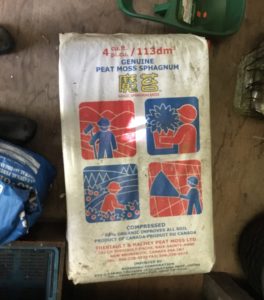Hello Fellow Readers,
For several years now I’ve had two bales of peat moss in my potting shed. For the life of me I don’t recall where they came from. Perhaps a donation from a client when they moved?
Sphagnum moss, or peat moss, is a genus of approximately 380 species. It’s a main ingredient in many indoor potting mixes and seed starting kits as it’s easy on the new roots of baby plants to penetrate through the fluffy stuff. Plus, peat moss can hold 16 to 26 times its weight in water depending on the species. Yet when potting plants or seeds in potting mix, water seems to run right out of the pot rather than absorb into the mix. It’s true, once it dries out it takes some doing to get potting mix or peat moss to start soaking up water. But once its wet again, it’s slower to evaporate. Or at least that’s the theory.
Peat moss is also a common soil supplement which has always mystified me. It’s been sold to gardeners since the mid-1900’s, though many I ask aren’t quite sure why they use it. Rather, it’s become a habit in their planting routines. Advocates say it lightens up heavy soils and adds the ability to maintain moisture and nutrients in sandy soils. And, because of its sterility, its free of weed seeds, disease or pathogens. It’s very acidic though, a pH between 4.7 and 5.2, when most herbaceous plant material prefers only slightly acidic 6.6 pH. For most of us in this area with already acidic soil, adding peat moss doesn’t seem wise. Unless your growing blueberries or other highly acid loving crops.
Then there’s the environmental controversy over peat moss harvesting from peat bogs. It turns out 97% of the United States import of peat moss comes from Canada which represents 85% of their total production; though the Canadian Sphagnum Peat Moss Association (CSPMA) states only 0.03% of their natural peat bogs have been or are currently being harvested. There’s reams of articles and data on the controversy of peat moss production versus the peat moss industry’s debate its environmentally sound; such as the International Peatland Society (IPS) “dedicated to the responsible management and Wise Use of peatlands and peat.” Yet the Royal Horticultural Society states they are “acutely conscious of how precious peat bogs are and how vital it is to change gardening behaviors, which is why our gardens are now 97 percent peat free.”
Some suggest coconut fiber, called coir from the hull of coconuts, as an alternative to peat moss. Coir is a waste byproduct of coconut processing and therefore is considered environmentally sound to use. Coir is easy to re-wet and comes in handy compressed bricks to boot. But coconut fiber too is slightly acidic, a pH of 5.2 to 6.3, and pricey to purchase.
Seems to me it’s best to rely on organic compost or leaf mold as a soil supplement; hence why I still have two bales of peat moss sitting idle. And maybe why they were leave behinds from a gardener on the move. Garden Dilemmas? Askmarystone@gmail.com



